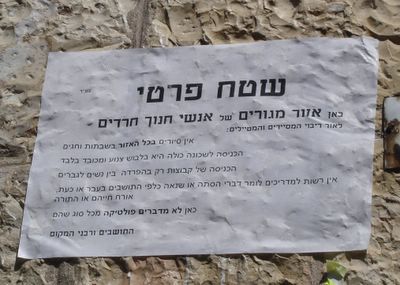Boundaries
I saw this sign in a neighborhood near the Mahane Yehuda market yesterday:
Here’s my translation:
Private Area
This is a residential area of haredi [strictly religious/ultra-Orthodox] educators.
In light of the increase in tourists:
No tours are allowed in the entire area on the Sabbath and Jewish holidays.
Entrance to the entire neighborhood is permitted only to those in modest, respectable dress.
Entrance is permitted only to groups in which there is complete separation between men and women.
Tour guides are not permitted to make statements containing incitement or hatred regarding past or present inhabitants, their way of life or the Torah.
No politics of any kind are to be discussed here.
—The residents and rabbis of the neighborhood
A city like Jerusalem usually attracts a large number of tourists (yes, thank goodness, they’re coming back). And there are quite a few neighborhoods here whose way of life differs significantly from what people might consider the standard Western model. (Heck, even I have had tourists from the US treat me as though I should be kept under glass because I live, work and shop in the Holy City—and I’m originally from the US myself!) So I can certainly sympathize with a neighborhood’s desire for peace and quiet, and of course for respect. I’ve been there, too.
From September 1998 until March 2000, I lived in Jerusalem’s Old City as a house-sitter. The apartment in which I lived was located in the Jewish Quarter, a popular tourist destination, and overlooked the Western Wall. One of the friends I made there, a permanent resident of the Jewish Quarter and, if memory serves, a member of its residents’ council, told me of the problems she and her neighbors had with tourists who spoke loudly under their windows at all hours of the night. She wanted very much to remind them, politely of course, that although Jerusalem is a holy city, it is also a city where real people live, work, raise families and, as a consequence of all these, need their sleep.
I particularly remember the incident in which several young yeshiva students, evidently affected by the high level of spirituality that prevails here, felt drawn to sing beautiful religious ballads at the top of their voices in the rear of the Western Wall Plaza at one o’clock in the morning. Esteemed readers, do you know what is located in the slope just behind the Western Wall Plaza? Residential apartments. Dozens of them, all containing people who are usually asleep at that hour. I went downstairs in a modest house-dress (modest enough to be seen outside there, but also house-dressy enough to give the young singers a clear message regarding what time it was) and politely bawled them out, reminding them that gezelat shena (stealing sleep from others) is considered a serious violation of Jewish law.
Anyway, about the sign. I have to admit I was a bit confused by the regulation forbidding tour guides to “make statements containing incitement or hatred regarding past or present inhabitants, their way of life or the Torah.” Exactly what constitutes incitement or hatred in this case? Would this mean, for example, that a tour guide just a kilometer or so away would not be allowed to mention the enmity between the haredi population and Eliezer Ben-Yehuda, who revived the Hebrew language? Unfortunately, this enmity, which was a well-known fact of Jerusalem life in its day, still exists—to the extent that every plaque installed outside Ben-Yehuda’s former residence indicating that he once lived there has been forcibly removed. So the only reason anyone knows where Ben-Yehuda once lived, and why there is no plaque indicating this at the site, is that tour guides tell them so! (One also wonders what juicy stories about “past or present inhabitants” the sign-makers would like to keep from the general public. After all, every neighborhood has its stories, and since some of these places are more than a century old, there must be quite a few by now.)
I agree that no one should have to listen to criticism—even legitimate criticism—of their way of life beneath their very windows. But where does respect end and control begin? I recall, le-havdil (to make a separation), being told by the caretaker at an archaeological site owned by a particular foreign church that outside tour guides are not permitted to speak to groups at their site. When I asked why, the young man eventually explained that these tour guides have an unpleasant habit of describing his church as a missionary organization. Yet that is exactly what it is! So what is to prevent the tour guides from telling this to their groups while they’re on the bus, before or after they arrive?
By the same token, what is to prevent tour guides from making critical statements, or even perpetuating unfortunate stereotypes, about the inhabitants of these neighborhoods before or after they come with their groups? (And yes, regrettably, some do perpetuate such stereotypes. I have direct experience of that.)
If the residents and rabbis of these neighborhoods are so concerned that tour guides might speak critically of them that they have to put up a sign forbidding it, why don’t they train their own guides or meet with the outside guides to discuss their concerns? Surely we know by now that censorship doesn’t work. Silencing critics does not make criticism go away, whether the criticism is justified or not. (Especially here in Israel, where people are not exactly known for their reticence.)
I like the ban on discussing politics, though. I think I may go hang out there when I’ve had my fill of translating news.

No comments:
Post a Comment
Comments are moderated. If you're a spammer, don't waste your keystrokes. If you're a real, honest-to-goodness commenter, welcome!